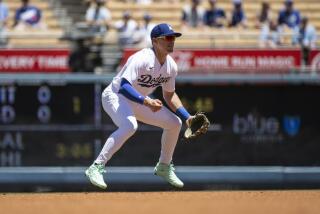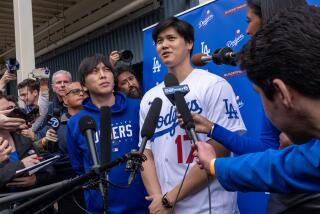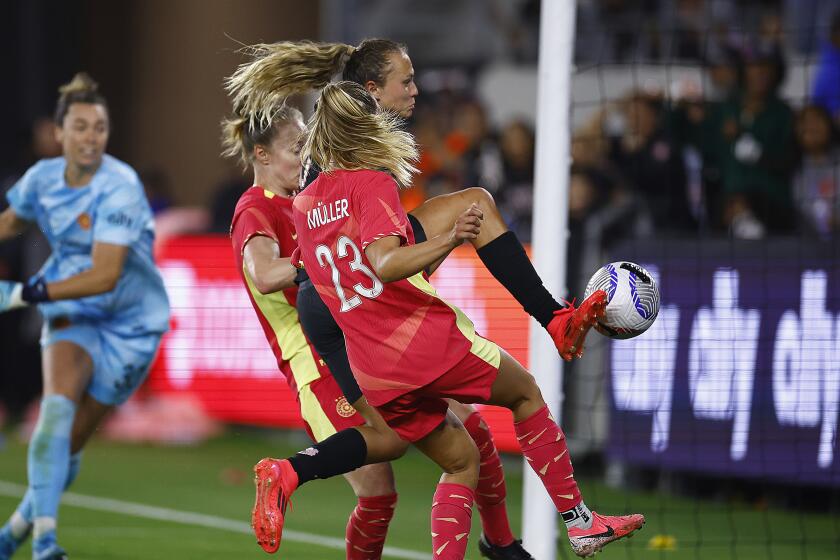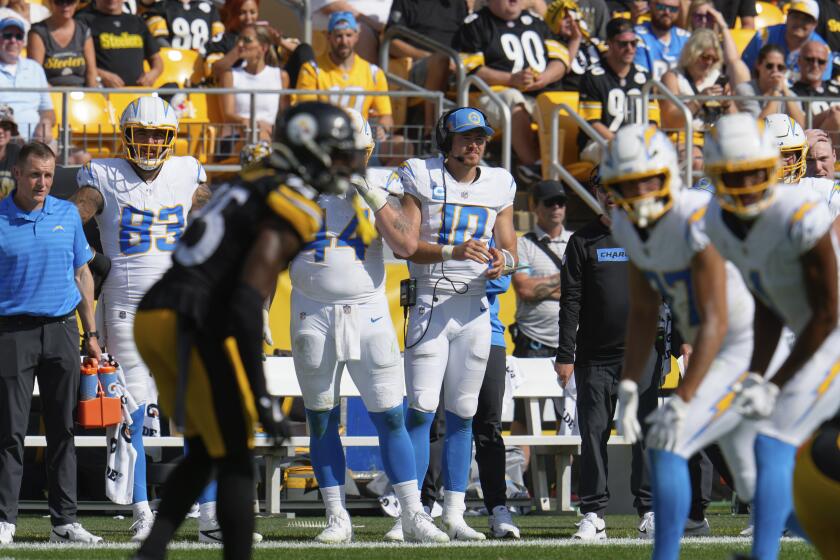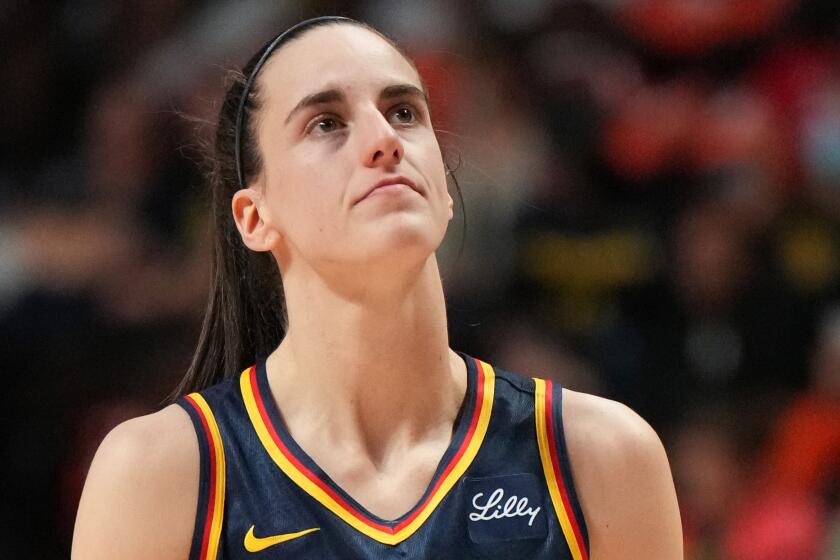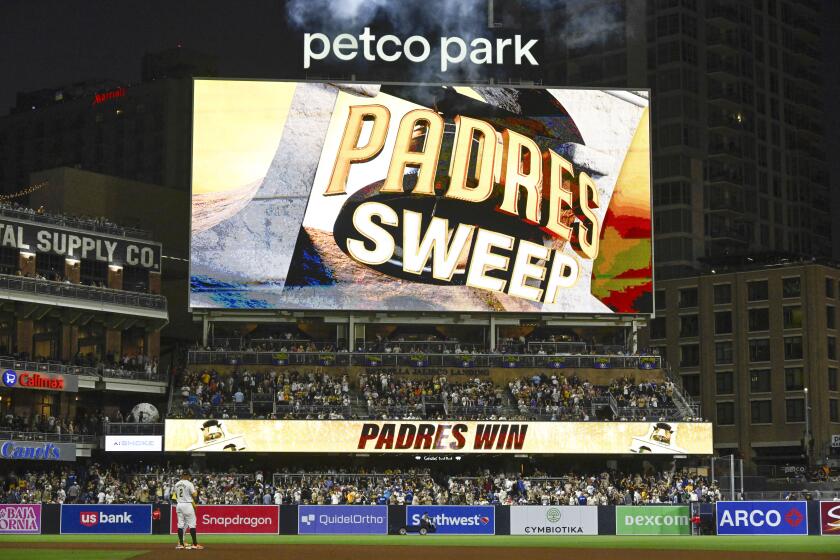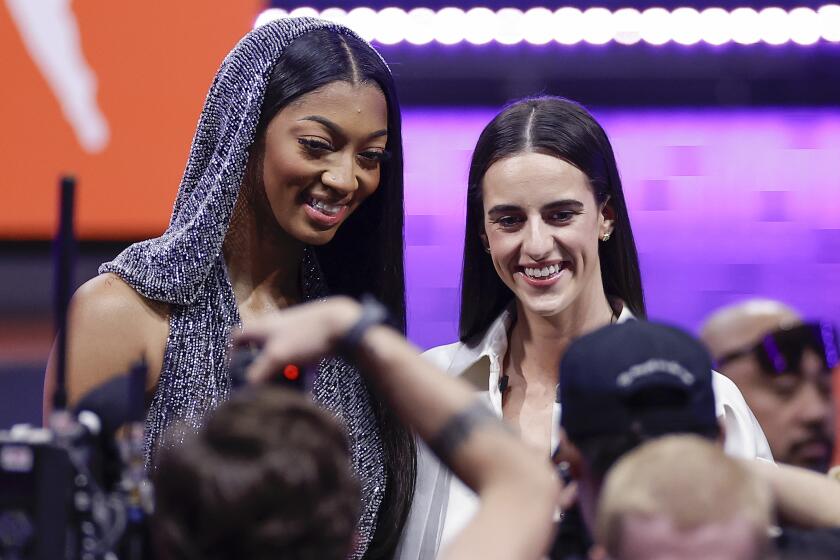Bankruptcy judge approves sale of Dodgers despite MLB objection
WILMINGTON, Del. — The sale of the Dodgers to a group fronted by Magic Johnson was approved by a federal bankruptcy judge on Friday, but not before a tense and acrimonious evening court session in which Major League Baseball failed to get a second chance to review the transaction.
The sale is set to close April 30. If the deal closes as scheduled, the Dodgers would play their first home game under the new ownership of Guggenheim Baseball on May 7, against the rival San Francisco Giants.
In approving the sale, U.S. Bankruptcy Judge Kevin Gross rejected the league’s claim to a final say in the deal and forced MLB to live by its settlement with Frank McCourt, an agreement that has outraged several owners because of how much sovereignty the league ceded in order to get McCourt to sell the Dodgers.
In a two-hour verbal war that stunned Gross, attorneys for the Dodgers and MLB tossed allegations around the courtroom as freely as baseballs.
Bruce Bennett, an attorney for the Dodgers, suggested the league had “manufactured” issues out of its distaste for McCourt and called MLB a “serial violator” of its settlement with him.
“How many laws that violates, I do not know,” Bennett said.
Thomas Lauria, an attorney for MLB, said that incoming Dodgers controlling owner Mark Walter made a promise regarding the Dodger Stadium parking lots to induce MLB owners to approve his group and then refused to provide documents to back up his pledge.
Lauria also said that a representative of the new owners had threatened litigation if MLB did not back down and that the Dodgers were “jamming” documents past the league solely so that McCourt could get his money in time for the $131-million divorce settlement he must pay April 30.
At the center of Friday’s fight was the authority of the court-appointed mediator responsible for enforcing the settlement between McCourt and MLB.
The mediator has the power to mediate disputes regarding the settlement terms even after the Dodgers exit bankruptcy, a provision Lauria said would be unfair to other teams without recourse to challenge the decisions of Commissioner Bud Selig.
Lauria said MLB did not want a league of “the Dodgers and the other 29 teams.”
The settlement includes confidential provisions about how the league could treat revenue from a Dodgers-owned regional sports network, Bennett said. He declined to elaborate, but the provisions are believed to limit how much of the Dodgers’ television proceeds must be shared with other teams via revenue sharing.
Those conditions — and the ability of the mediator to enforce them regardless of what Selig might say — represented what Guggenheim attorney Michael Small called a “substantial component of the value proposition of the transaction.”
Guggenheim agreed to pay $2.15 billion — a record price for a sports franchise — to buy the Dodgers and half-ownership of the Dodger Stadium parking lots. McCourt, who did not have to sell the land under his settlement with MLB, gets to retain half-ownership.
“We really are concerned about the parking lot situation,” Lauria said.
Lauria said that Walter had pledged to MLB owners that he would not buy the Dodgers unless Guggenheim controlled 16,500 surface-level parking spaces — that is, no parking structures. Once the sale was announced, however, Lauria said Guggenheim refused to provide any details about how the joint venture to own the parking lots would work.
The Dodgers submitted some of those details under seal this week, and attorneys for the Los Angeles Times had asked Gross to compel the team to release the details publicly. The Dodgers instead withdrew the document and said they would release it at a later date, although Bennett said Friday the team’s lease for the lots would be extended from 25 years to 99 years.
The money a fan pays to park at Dodger Stadium will be collected by the new owners, but neither McCourt nor Guggenheim has explained how the parties will divide the revenue the team generates from the parking lots.
And, although people familiar with the sale agreement say no development can take place on the parking lots unless McCourt and Guggenheim agree, neither party has shared a vision for the future of the property.
As Gross conducted a morning session Friday, attorneys for MLB, McCourt and Guggenheim met with the court-appointed mediator. Those meetings continued for eight hours, with Lauria deciding to appeal directly to Gross, who said he did not expect the hearing to take such a hostile turn.
“I had no idea,” Gross said. “I thought this was going to be a celebration-type occasion.”
Although MLB had yielded the final say to McCourt in the settlement, Lauria said no party could announce the sale of an MLB team without league review and approval.
“We were unable to do what the other owners would have expected,” Lauria said.
McCourt took the Dodgers into bankruptcy 291 days ago, three days away from running out of cash to pay his players. Although he said he intended to retain ownership when the Dodgers emerged from bankruptcy, his surrender is expected to net him close to $1 billion in profit.
“I want to congratulate Mr. McCourt, who I think was able to see the big picture,” Gross said.
twitter.com/BillShaikin
More to Read
Go beyond the scoreboard
Get the latest on L.A.'s teams in the daily Sports Report newsletter.
You may occasionally receive promotional content from the Los Angeles Times.

